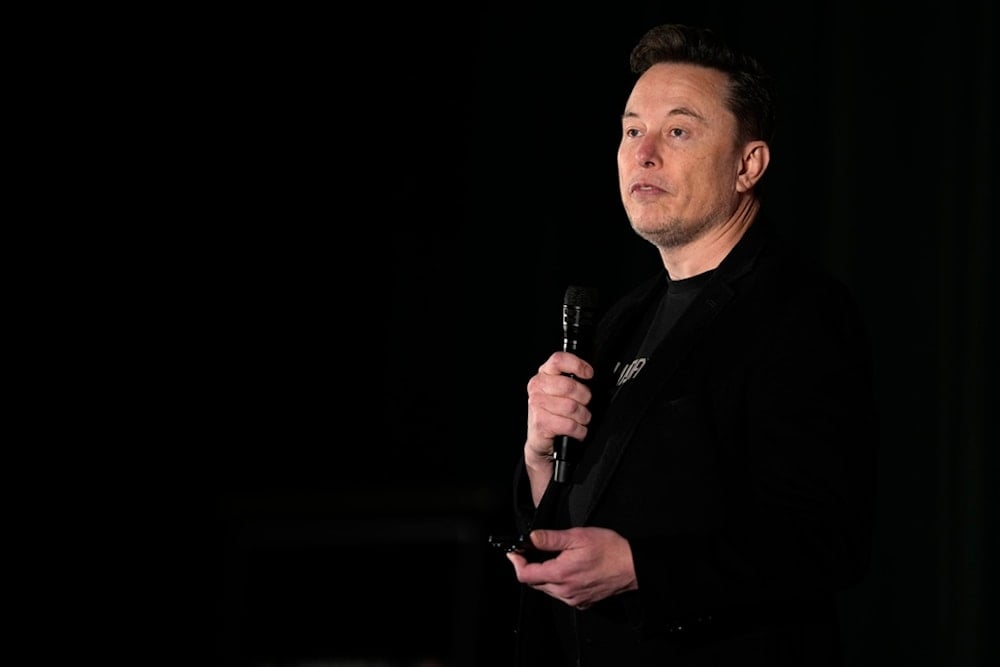Musk talk with Germany's AfD leader heats up debate on political bias
Elon Musk's recent discussion with the AfD's Alice Weidel has posed questions regarding its lawfulness and potential political advertising.
-

Elon Musk speaks as part of a campaign town hall in support of Donald Trump in Folsom, Pennsylvania, on Thursday, October 17, 2024. (AP)
During a live talk on his platform X, Elon Musk commended the co-leader of Germany’s far-right Alternative für Deutschland (AfD) party, reiterating previous statements he made about how only the AfD could save Germany.
Musk's virtual discussion with Alice Weidel on Thursday drew criticism for his support of far-right, anti-establishment parties such as Germany's AfD, particularly ahead of the country’s February 23 election, prompting accusations of his involvement and meddling in European politics. The conversation also highlighted his support for the AfD, currently polling second at 21.5%.
The nearly 75-minute discussion spanned topics such as energy policy, education, and their shared goal of reducing German bureaucracy and preventing illegal immigration. They also delved into broader subjects, including Douglas Adams and Schopenhauer, the meaning of life, debates about whether Adolf Hitler was a socialist or far-right extremist, and potential solutions to the so-called "Israel-Palestine conflict".
Musk and Weidel also criticized “woke” perspectives and seemed to align on various issues, including the urgency of ending the war in Ukraine, which Musk suggested could be ended swiftly with Trump.
In response to Weidel’s query about timelines for human expeditions to Mars, Musk predicted uncrewed missions could launch within two years, with crewed missions following in about four years.
Innocent dialogue or political meddling?
Before Thursday’s XSpace discussion, the European Commission announced it would examine whether the talk violated the Digital Services Act (DSA), focusing on concerns about potential platform bias rather than the conversation itself. LobbyControl, a transparency advocacy group, questioned whether the event breached German campaign finance laws, suggesting it could be interpreted as political advertising.
Amid growing concerns about Musk's influence on German politics, Germany's parliament initiated an investigation into the legality of the digital discussion. Weidel’s spokesperson rejected accusations of illegal party donations, emphasizing the conversation as a legitimate exercise of free speech, not prearranged.
Germany’s federal network agency stated it would monitor for potential algorithm manipulation on the platform and share any findings with the DSA.
Elon Musk's influence stirs up European politics: WSJ
Elon Musk is shaking up Europe’s political arena with a wave of provocative commentary on contentious topics like immigration and free speech. His interventions have presented European governments with a complex challenge, as they grapple with the tech billionaire's growing influence and his emerging role as a key advisor to the incoming Trump administration.
According to a recent piece by The Wall Street Journal, Musk’s actions are reshaping political dynamics across the continent, drawing attention to the intersection of technology, power, and governance.
In recent weeks, Musk has posted a string of inflammatory messages on X, the platform he owns, targeting European politics. His posts include backing the AfD ahead of Germany’s elections, accusing the British prime minister of complicity in rape, criticizing Italian judges, and attacking the European Commission.
Musk’s direct and confrontational approach to foreign affairs, as per the piece, underscores the challenge that US allies will face as they navigate the upcoming Trump presidency. During Trump’s previous time in office, foreign governments had to contend with his unpredictable late-night social media posts. Now, they must also contend with Musk’s influence.
In Germany, some strategists and politicians fear Musk's personal opinions may influence the general election in February.

 4 Min Read
4 Min Read








